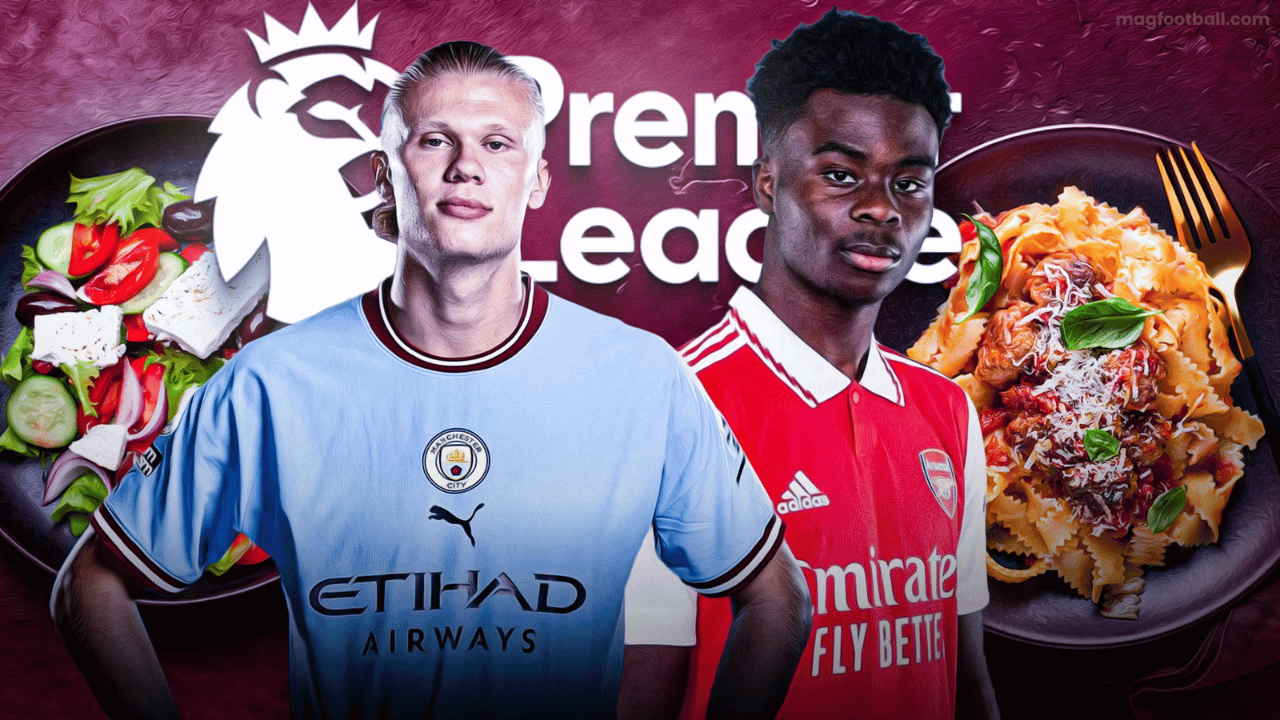Nutrition Plans for Professional Footballers: What They Eat to Achieve Peak Performance

In the world of professional football, players are not just athletes—they are finely tuned machines that must be maintained with optimal care. Achieving peak performance on the field requires more than just rigorous training; it also demands a meticulously balanced nutrition plan tailored to each player’s individual needs. Footballers around the world invest heavily in their diets, understanding that what they eat directly impacts their stamina, strength, speed, recovery, and overall performance. In this article, we will explore the essential elements of professional footballers’ nutrition plans, including what they eat before, during, and after matches, how they manage their diets during the off-season, and the specific foods that help them stay at the top of their game.
Table of Contents
Why Nutrition Is Critical for Footballers
The high intensity of football means players need a significant amount of energy to perform well. A typical 90-minute match requires a footballer to run anywhere between 8 to 12 kilometers, often at high speeds with bursts of intense activity such as sprints, tackles, and jumps. To maintain this level of exertion, their bodies need a steady supply of fuel in the form of carbohydrates, proteins, fats, and essential nutrients. Additionally, footballers must focus on recovery to minimize muscle soreness and prevent injury, which is why post-game nutrition is just as important as pre-game meals.
Macronutrients in a Footballer’s Diet
1. Carbohydrates: The Main Fuel Source
Carbohydrates are the primary energy source for footballers. Since the sport involves a combination of endurance and short bursts of explosive energy, footballers need a steady supply of glucose, which is derived from carbs. The body stores glucose as glycogen in the muscles and liver, which is then used during prolonged physical activity.
- Complex Carbohydrates: Footballers primarily consume complex carbohydrates such as whole grains, brown rice, sweet potatoes, and quinoa. These are slower-digesting carbs that provide sustained energy throughout training sessions and matches.
- Simple Carbohydrates: Before or during a match, footballers may consume simple carbohydrates found in fruits or energy gels, which provide a quick energy boost. Bananas, energy drinks, and sports gels are popular options that supply fast-digesting sugars when immediate energy is needed.
2. Proteins: Essential for Recovery and Muscle Repair
Proteins play a critical role in repairing and building muscle tissue, especially after the physical demands of a match or training. Professional footballers require a higher protein intake than the average person to ensure their muscles recover quickly and efficiently, reducing the risk of injury and improving overall strength.
- Lean Protein Sources: Footballers often turn to lean proteins like chicken breast, turkey, fish, and eggs to meet their protein needs. These provide the necessary amino acids for muscle repair without adding excess fat.
- Plant-Based Proteins: With the rise of plant-based diets in sports, footballers may also consume proteins from lentils, beans, tofu, and quinoa, which offer a complete amino acid profile for muscle recovery.
3. Fats: Supporting Energy and Hormonal Balance
While fats are often seen as the enemy of fitness, they are a vital part of a footballer’s diet. Fats provide a concentrated source of energy and are crucial for absorbing fat-soluble vitamins (A, D, E, and K) that support immunity and recovery. Healthy fats also help regulate hormones that are important for performance and recovery.
- Healthy Fat Sources: Footballers incorporate healthy fats into their diet from sources like avocados, nuts, seeds, olive oil, and fatty fish such as salmon. Omega-3 fatty acids found in fish are particularly beneficial for reducing inflammation and promoting joint health.
Timing of Meals: Pre-Match, During Match, and Post-Match Nutrition
Pre-Match Nutrition
Before a match, footballers aim to optimize their glycogen stores while avoiding foods that may cause digestive discomfort. A pre-match meal typically includes a balance of complex carbohydrates, moderate protein, and a small amount of healthy fats. This meal is consumed about 3-4 hours before kick-off to ensure the body has enough time to digest and convert the food into usable energy.
- Example Pre-Match Meal: Whole grain pasta with grilled chicken breast and a side of steamed vegetables or a turkey sandwich on whole grain bread with avocado.
Additionally, about 30 minutes before the match, players may consume a light snack, such as a banana or an energy bar, to top off their glycogen stores.
During the Match
Hydration and electrolyte balance are key during a match, especially in intense conditions or long-duration games. Footballers consume water and sports drinks to stay hydrated and replace lost electrolytes like sodium and potassium. Some may also use energy gels or chew on glucose tablets during halftime for an extra burst of energy.
- Example Halftime Fuel: A small sports drink or an energy gel with fast-digesting carbs to replenish glucose levels quickly.
Post-Match Recovery Nutrition
Immediately after the match, the focus shifts to recovery. The body needs carbohydrates to replenish glycogen stores and protein to repair muscle tissue. Many footballers consume a recovery shake or snack within 30 minutes of the game to kickstart the recovery process. This is often followed by a full meal rich in carbs, protein, and healthy fats within 1-2 hours.
- Example Post-Match Snack: A protein shake made with whey protein and a banana, or Greek yogurt with honey and berries.
- Example Post-Match Meal: Grilled salmon with quinoa and roasted vegetables, or a chicken and sweet potato bowl with a side of mixed greens.
Hydration: A Key Element in Performance
Water is vital for every footballer, not only for hydration but also for maintaining optimal body temperature, muscle function, and mental focus. Dehydration can significantly impair performance, leading to reduced stamina, muscle cramps, and fatigue. Footballers aim to stay well-hydrated throughout the day, and especially before, during, and after matches.
- Electrolytes: In addition to water, footballers also need to replenish electrolytes lost through sweat. Sodium, potassium, and magnesium are essential electrolytes that help prevent cramping and maintain energy levels. Many footballers use sports drinks or electrolyte tablets to maintain the right balance during intense training or games.
Supplementation for Footballers
While a balanced diet should provide most of the nutrients needed, some footballers incorporate supplements to optimize their performance and recovery. Common supplements include:
- Creatine: Known for improving muscle strength and endurance, creatine is popular among athletes who want to enhance their performance, especially during explosive movements such as sprints.
- Protein Shakes: While protein from food sources is ideal, footballers often use protein shakes for convenience, especially post-match or after intense training.
- BCAAs (Branched-Chain Amino Acids): BCAAs help reduce muscle soreness and support recovery, making them a favorite supplement for footballers who undergo rigorous training.
- Fish Oil (Omega-3): As mentioned earlier, omega-3 fatty acids found in fish oil can reduce inflammation and support joint health, which is particularly beneficial for footballers who are constantly putting stress on their joints.
The Role of Nutrition in Injury Prevention and Longevity
Footballers’ careers are physically demanding, and nutrition plays a crucial role in injury prevention and career longevity. Proper nutrition helps strengthen bones, maintain muscle mass, and reduce inflammation, all of which are essential for avoiding injuries like muscle strains, ligament tears, and bone fractures.
- Anti-Inflammatory Foods: Foods like fatty fish, turmeric, ginger, and green leafy vegetables have natural anti-inflammatory properties that help footballers recover faster and reduce soreness.
- Calcium and Vitamin D: To maintain strong bones, footballers need to ensure adequate intake of calcium (from dairy products or fortified plant milks) and vitamin D (from sunlight, fortified foods, or supplements).
Footballers’ Diets in the Off-Season
During the off-season, footballers adjust their diet to reflect the lower physical demands. While they may reduce their calorie intake to avoid gaining unnecessary weight, they still maintain a balanced diet rich in nutrients to support recovery and prepare their bodies for the upcoming season. Footballers often focus on lean proteins, healthy fats, and moderate carbs while cutting down on energy-dense, processed foods.
Conclusion: Footballers’ Diet for Peak Performance
A footballer’s diet is not just about eating healthy; it’s a scientifically calculated plan designed to fuel optimal performance on the pitch, aid in rapid recovery, and maintain long-term health. Carbohydrates provide the energy needed to keep players running for 90 minutes, proteins support muscle repair and growth, and fats play a critical role in hormone regulation and inflammation control. By understanding the key elements of their nutrition and staying disciplined, professional footballers are able to perform at their best and extend their careers to new heights.



